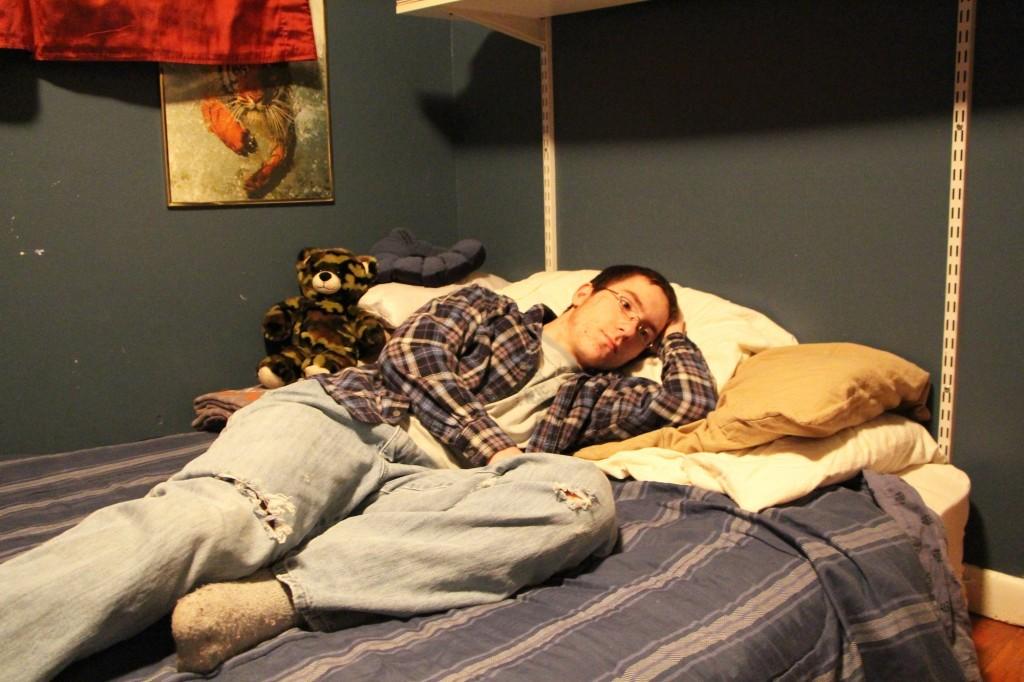As songbirds begin to chatter and greet the new day, JA Kaufmann closes the book he has been reading for hours. His bed sits untouched, perfectly made, after JA stayed awake while the rest of the world slept.
Kaufmann, junior, was diagnosed with stress-linked clinical insomnia at 8 years old. The condition is characterized as an individual’s inability to sleep or fall and stay asleep for long periods of time.
According to the Association for Behavioral and Cognitive Therapies, insomnia affects 15-30 percent of all people worldwide, only half of whom seek professional help. JA has gone to a doctor and tried several medicines, few of which seem to work.
“I try to think about nothing, but no matter how hard I try I just can’t go to sleep,” Kaufmann said. “Even the smallest amount of time feels like forever.”
Cynthia Edwards, Kaufmann’s mother, said JA’s insomnia was difficult not only on JA, but also on her. Early in his insomnia, since JA could not sleep, he wanted to be active late at night, making sleep difficult for the rest of the family.
“It was frustrating and hard to deal with the insomnia at first,” Edwards said. “I used to want to stay up with my kids, but it was a fight just to get him to lay in bed. Our day lasted until midnight, and keeping up was not an easy task.”
Edwards also has a younger daughter, who she said most likely suffers from insomnia as well, but has not been officially diagnosed, and a younger son, who has regular sleeping patterns. JA and his sister are allowed to stay up as late as their conditions force them to, so long as they are quiet enough for the rest of the family to sleep.
“I tried to stay up with him, but I felt myself get crabbier and crabbier as I slept less and less,” Edwards said. “His body just won’t turn off, but we just had to learn how to deal with it. It became the new normal.”
After developing insomnia, Kaufmann said there was an initial impact on his activity in school. He has, however, learned to work with whatever sleep he gets, which can be as little as two hours a week, and tries not to use his insomnia as an excuse for times when he is too tired to focus fully or is in a bad mood.
“When it first started, if I did eventually get to sleep, it was hard to get up in the morning and it was difficult to focus,” Kaufmann said. “Usually, I was able to keep my emotions in check, but I did get crabby once in awhile.”
When left untreated, insomnia has been linked to increased illness or susceptibility to diseases, according to The Sleep Foundation. Kaufmann said he typically does not do anything for his insomnia, but can take medication when he really needs sleep, like before a test.
Because he tends to stay up late when he chooses not to take sleep aids, Kaufmann said he learned over time how to benefit from his sleep disorder and uses it to help him in school.
“Usually when I can’t go to sleep, I’ll stay up and do school work or read,” Kaufmann said. “And with the benefits of extra studying, insomnia hasn’t been a detriment to [my academics]. If anything, it’s probably more of a benefit. If I study while I’m up, it gives me more of an edge.”
According to his mother, Kaufmann is a high achieving, “top-tier” student. Kaufmann said he isn’t different from other students just because of the disorder.
“[In school], I try to challenge myself and get the perfect score,” Kaufmann said. “I haven’t let insomnia stand in the way of that yet, and I won’t in the future.”











